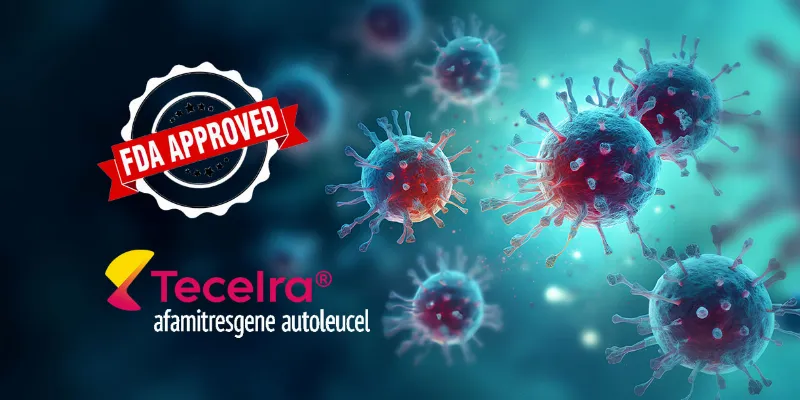Novel Cell Therapy Tecelra Receives FDA Accelerated Approval for Synovial Sarcoma

2 August 2024
The FDA has granted accelerated approval to Tecelra (afami-cel), for treating adults with advanced synovial sarcoma. This marks the first time a cell therapy has been approved for a solid tumor, offering new hope to patients based on promising results from the SPEARHEAD-1 trial, which showed a 43% response rate and potential long-term benefits.
Adaptimmune Therapeutics announced that the US Food and Drug Administration (FDA) has granted accelerated approval to TECELRA® (afamitresgene autoleucel), a novel engineered cell therapy specifically designed for treating adults with advanced synovial sarcoma. TECELRA® targets patients with specific HLA types and tumors that express the MAGE-A4 antigen, offering an effective treatment option for those with limited alternatives following prior chemotherapy.
Dr. Sandra D'Angelo, a sarcoma medical oncologist and principal investigator of the trial, emphasized, “This approval represents a much-needed new option for people diagnosed with this sarcoma and an important milestone for the use of cell therapies in solid tumor cancers.”
Groundbreaking Trial Results
The SPEARHEAD-1 trial, an open-label phase 2 study published in The Lancet, involved 44 patients over the age of 16 diagnosed with advanced synovial sarcoma or myxoid round cell liposarcoma. The participants required a positive test for certain HLA types and a minimum MAGE-A4 expression. The study highlighted an overall response rate of 43% with a median response duration of 6 months., and importantly, 39% of the responders maintained their response for a year or longer.
Adrian Rawcliffe, Adaptimmune's Chief Executive Officer, expressed optimism about the approval, pointing out, “The approval of TECELRA is a momentous step in Adaptimmune’s journey to redefine the way cancer is treated and the culmination of a decade of groundbreaking R&D. We are committed to advancing our robust clinical pipeline to serve more patients in need and plan to progress lete-cel, the next late-stage investigational treatment in our sarcoma franchise, with a rolling BLA submission to the FDA next year.”
Adaptimmune is gearing up for a comprehensive rollout of TECELRA®, including the establishment of authorized treatment centers and an integrated support program, AdaptimmuneAssist, to ensure a seamless treatment experience.
Addressing the Unmet Need
Brandi Felser, CEO of the Sarcoma Foundation of America, highlights the critical nature of this approval: “For decades, therapeutic options for people diagnosed with synovial sarcoma have been limited. With a current five-year survival rate as low as 36%, and for those with metastatic disease at diagnosis, as low as 20%, it is long past time that synovial sarcoma patients have expanded treatment options. Since one third of patients are diagnosed under age 30, improved outcomes can have a tremendous impact. Today, there is a renewed sense of hope for this patient community.”
Safety and Efficacy Monitoring
Despite the promising outcomes, TECELRA® comes with a significant safety profile, necessitating careful monitoring for cytokine release syndrome, immune effector cell–associated neurotoxicity syndrome, and other potential adverse effects. Continuous approval will depend on further verification from ongoing clinical trials aimed at solidifying its clinical benefits.
The SPEARHEAD-1 Trial
The SPEARHEAD-1 phase 2 trial evaluated the efficacy of afamitresgene autoleucel (afami-cel) in treating advanced synovial sarcoma and myxoid round cell liposarcoma in patients who express HLA-A*02 and MAGE-A4. Conducted across 23 sites in Canada, the USA, and Europe, the trial involved patients aged 16-75 who had undergone previous chemotherapy. Of the 52 enrolled patients, the overall response rate was 37%, with a notable incidence of cytokine release syndrome in 71% of participants but no treatment-related deaths. The results indicate that T-cell receptor therapy can effectively target solid tumors, suggesting potential applications for other malignancies.











Comments
No Comments Yet!